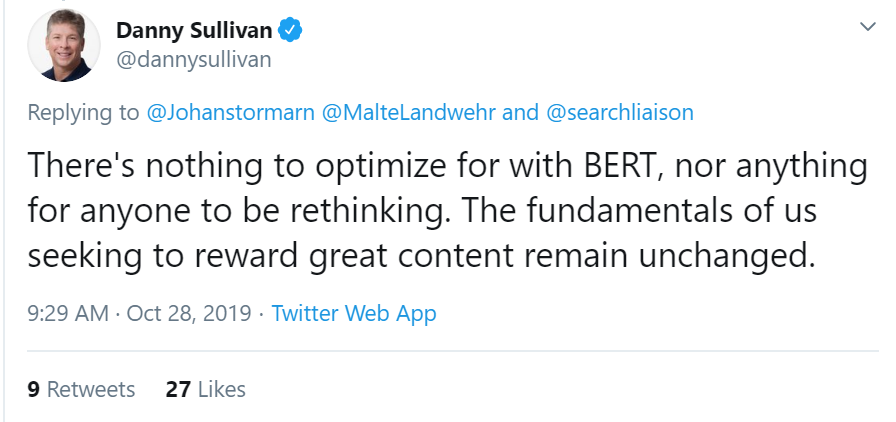Bert is an algorithm update by Google which is said to be the biggest update since RankBrain. RankBrain is a machine learning based system used by Google to process the search queries. The BERT update focuses on how to relate the search query to user intent and provide the user with the most accurate website results. Google makes use of NLP (Natural Language Processing) to better understand the real requirement behind the keywords typed in by the user.
Danny Sullivan, a Google search engine liaison, Tweeted recently that there is nothing to do to optimise your website for the BERT update. Is this entirely correct? What can you do if your website is affected after this update?

Before we start discussing the ways to optimise your website for this update, it is important to know how BERT will potentially affect your website. With this update, the way Google looks at the search queries is going to change. The update is said to have affected 10% of the Global search queries.
What Google is trying to do is actually understand the intent behind the user’s search query. For example, if you try to search for “Hotels in Tasmania”, you will see that there are many related words below the search box. When you select one of them you will see different results being loaded.
Similarly, you should design your website in such a way that the search terms connect to your website content.

Tips to bear in mind when optimising your site:
- Internal Link Building: Effective internal link building lets search engine’s realise that your website follows a strong structure protocol and the search engine will understand more about your website.
- Content: Updating the content regularly and writing more and more content in and around your niche is very important.
- Relevant topics: Take a look at the way your website titles are presented. Do they relate to what your business provides? If not, try to change them and make them more relevant and consistent.
- Blog posts and Articles: Having more content will definitely help search engine’s understand and relate the search queries to your business. But make sure that the content and information you write in your web pages including blogs, articles and white papers is related to the business/service you provide. Remove any kind of unrelated, irrelevant and thin content from your website.
- Technical SEO: Even though your website will never be technically ‘perfect’, the SEO of your website should have a green light for factors such as structured data, secure connection, no broken links and so on.
The above points are just the tip of the iceberg. It is true that there is not much you could do from a “BERT’s” perspective, but there are many ways to optimise your website to stay on top of the search results page. If you would like to receive more information on website optimisation, please feel free to contact us.
For tips to make your website visible and rank better, read this blog.








